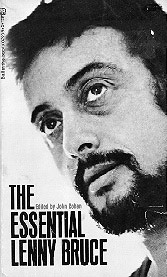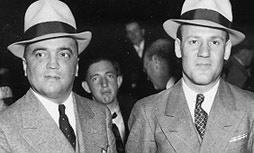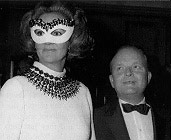
Time period: 1950s and 1960s
The opening page of the book shown below features the following quote from Lenny:
People should be taught what is,
not what should be. All my humor
is based on destruction and despair.
If the whole world were tranquil, without
disease and violence, I'd be standing in the
breadline -- right back of J. Edgar Hoover.

According to The Essential Lenny Bruce he was at the Troubador in Los Angeles on October 24, 1962, and got arrested for obscenity. Bruce was also arrested in San Francisco, Chicago and Miami at various points in his career. His birthday was October 13, and he died August 3, 1966.
Eric hid the rubber in his room, pressed into a box of playing cards. He took a long look at Jayne Mansfield's picture before he slipped it into the world atlas on his desk. He realized that Jayne's breasts were not as real-looking as he'd thought in his emotionally vulnerable state, dick in hand. They reminded him of something but what? And then he saw it. The bumper bullets on a Cadillac. (517)
These creative minds with their sublimated forms of destruction. Every third campaign featured some kind of play on weapons. The agency was still in shock over the Equinox Oil campaign. This was a very expensive effort that culminated in a sixty-second commercial shot in the Jornada del Muerto in remotest New Mexico. Site of the first atomic test shot ever made. (529)


On November 28, 1966, Truman Capote put on the Black and White Ball at the Plaza Hotel. The guest list included many of the most influential, rich and famous people in America and the rest of the world.
The New York Times ran several stories on the event. "Capote's Black and White Ball: 'The Most Exquisite of Spectator Sports'" by Charlotte Curtis appeared the next day (page 53), and on the same page was "Behind the Masks" by Enid Nemy, along with the invite list. Among those invited were writers Norman Mailer, Peter Mathiesson, Philip Roth, Tennessee Williams and Edward Albee. Celebrities like Greta Garbo, Mr. & Mrs. Frank Sinatra (married to Mia Farrow at the time), Sammy Davis Jr., Douglas Fairbank Jr. and Elizabeth Taylor & Richard Burton (no-shows) were also invited. Then there were various Rockefellers, Vanderbilts, Rothschilds. And of course Andy Warhol. Capote calls the rest of the guests "international types, lots of beautiful women and ravishing little things."
"The millionaire author had asked the men to wear dinner jackets with black masks and the women to wear black or white dresses with white masks." We learn that "Frank Sinatra let his wife, Mia Farrow, twist most of the fast numbers with Bennett Cerf's son, Christopher.... Arthur Schlesinger Jr. and William F. Buckley, neither of whom are short men, kept dancing with taller women."
There was some further gossip on the party in "David Merrick, Taking a Cue From Capote, Will Back a Party of His Own" on December 11, 1966 (NYT - p. 90). According to this report, the party cost about $16,000 to put on. Capote says:
We had two crashers and I caught them both. When I heard their names announced, I knew I didn't know them, and I said, 'I'm sorry. I don't know you,' and the woman said, 'Oh, we just wanted to come in for 5 or 10 minutes.' Can you imagine that?
However, J. Edgar and Clyde are not mentioned among the guests.
Thanks to Phil Nel for his research.
And this was Dow Day here in Madison, a protest against Dow Chemical, whose recruiters were active on campus and whos products included a new and improved from of napalm with a polystyrene additive that made jellied matter cling more firmly to human flesh. (599)
But the point I'm making is that the Long Tall Sally in the song and the Long Tall Sally they painted on our nose are not one and the same female of the species.
...
Because she black and she bad. (609)
On the night of the great New York City blackout, Nick heads to "a place practically outside time, called Frankie's Tropical Bar, on the Lower East Side" (617). DeLillo's characters have been there before. Check out the last five pages or so of the Cosmic Erotics section of the Running Dog, when Moll Robbins and Glen Selvy go out for a night of "serious drinking." And pay attention to the other "denizens" of the bar. (Thanks to Joshua Roberts for this one).
In 1961, it's in Charlie Wainwright's office on Madison Avenue. (529)
By 1969, Chuckie can only remember the ball.
But he couldn't think of his father without regretting the loss of the one thing he'd wanted to maintain between them. That was the baseball his dad had given him as a trust, a gift, a peace offering, a form of desperate love and a spiritual hand-me-down.
The ball he'd more or less lost. Or his wife had snatched when they split. Or he'd accidentally dumped with the household trash. (611)